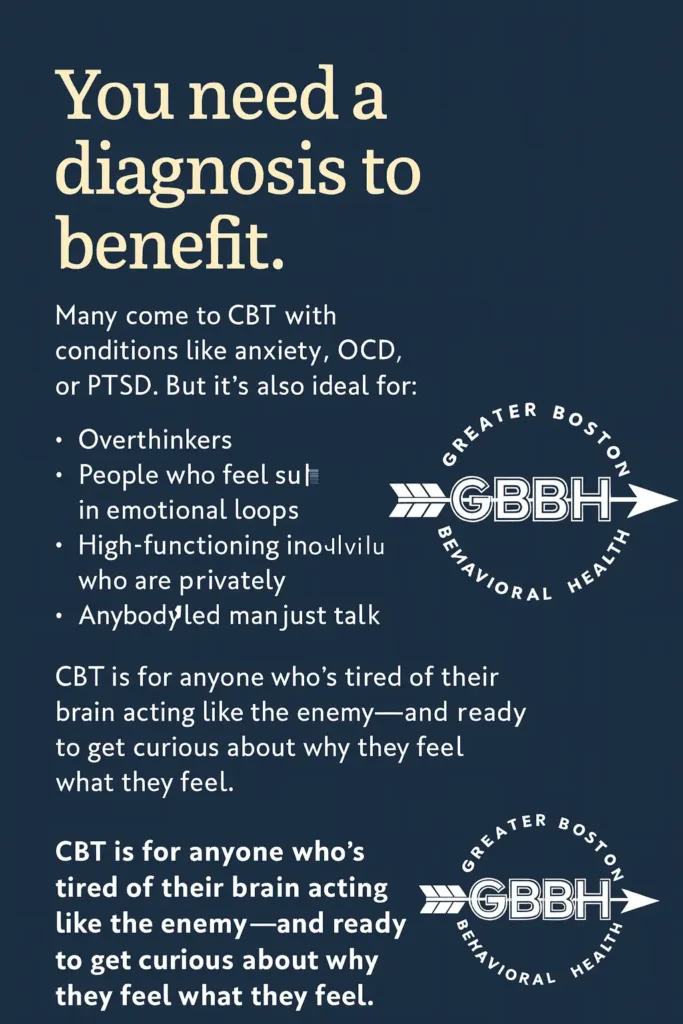There’s a quiet kind of knowing that creeps in before you ever say the words out loud: “I think I need help.” Maybe it’s the panic that hits at random. Maybe it’s the way your thoughts loop when you’re trying to fall asleep. Or maybe it’s just the realization that you’re tired of surviving every day like it’s a high-stakes test you didn’t study for.
Whatever brought you here—it matters. And we’re glad you came.
At Greater Boston Behavioral Health, we work with people who aren’t falling apart—but aren’t okay, either. People who’ve been holding it together for a long time and are finally ready to find another way.
One of the most effective, accessible, and practical therapy approaches we offer is called CBT, or Cognitive Behavioral Therapy. And no—it’s not just about “thinking positive.”
CBT helps you understand your mind, your patterns, and your reactions. More importantly, it gives you skills you can actually use—not just in therapy, but in the real world, for the rest of your life.
What Is CBT—and Why Does It Work?
Cognitive Behavioral Therapy is a structured form of talk therapy that focuses on how your thoughts, feelings, and behaviors are connected.
In simple terms:
- Your thoughts affect how you feel.
- Your feelings affect how you act.
- Your actions reinforce your thoughts.
CBT teaches you how to break that loop where it’s harming you—and create new loops that support your well-being.
CBT isn’t about pretending everything’s fine. It’s about helping your brain stop treating everything like an emergency.
With CBT, you learn how to catch distorted thinking, challenge assumptions that aren’t helping you, and respond to stress in healthier, more intentional ways.
You Don’t Need a Diagnosis to Benefit
Many people come to CBT after being diagnosed with something like anxiety, depression, OCD, or PTSD. But you don’t have to have a diagnosis to benefit.
CBT is also ideal for:
- Overthinkers
- People who feel stuck in emotional loops
- High-functioning individuals who are privately overwhelmed
- People facing a life transition or identity shift
- Anyone who wants tools—not just talk
CBT is for anyone who’s tired of their brain acting like the enemy—and ready to get curious about why they feel what they feel.
It’s not about being “sick enough.” It’s about wanting something better.
CBT Gives You Tools You Can Use Outside the Office
What makes CBT stand out is how practical it is.
You’re not just talking about what’s hard. You’re learning what to do about it.
That might look like:
- Keeping a thought log to recognize patterns
- Learning breathing or grounding strategies for panic
- Practicing new responses in challenging conversations
- Developing a plan for when you feel triggered or low
- Creating small behavioral experiments to rebuild confidence
One of the most empowering moments in CBT is realizing you’re not just a passenger in your mental health—you’re a participant.
These aren’t fluffy affirmations. These are real skills that make you feel more in control of your emotions, your relationships, and your choices.
It Helps You Interrupt the Spiral Before It Takes Over
If you’ve ever had a single thought turn into a whole-day meltdown—you already understand how powerful your mind can be.
CBT helps you:
- Identify when a thought is fueling your anxiety or shame
- Question the story your brain is telling you
- Create more balanced thoughts without dismissing your feelings
- Reduce the intensity of your emotional reactions over time
For example, instead of:
“I’m going to mess this up and everyone will see I’m a failure.”
You might learn to think:
“I’m nervous about this, which makes sense. But it doesn’t mean I’ll fail.”
That shift doesn’t erase your fear. But it softens it. It slows the spiral. And it creates just enough space to choose a different action.
CBT Meets You Where You Are—No Performance Required
Starting therapy can feel intimidating—especially if you’ve never done it before.
CBT takes the pressure off. You don’t need to have all the answers. You don’t need a dramatic story or a breakdown to justify showing up.
You just need to be curious about yourself. That’s it.
At Greater Boston Behavioral Health, our CBT therapists work at your pace. We ask questions gently. We explain things clearly. We don’t use shame or jargon.
Our job is not to fix you. It’s to help you discover tools that support the version of you that already exists—and deserves care.
CBT Builds Lifelong Mental Resilience
The goal of CBT isn’t just symptom reduction (though that happens). It’s about building resilience—so you can handle the next hard thing with more clarity, more calm, and more confidence.
Over time, CBT can help you:
- Feel less controlled by your emotions
- Get unstuck from negative self-talk
- Improve your communication in relationships
- Set better boundaries
- Feel more grounded in your day-to-day life
Think of CBT like mental strength training. You’re not just reacting less—you’re recovering faster.
That’s not just therapy. That’s life-changing.
What It’s Like to Start CBT in Boston, MA
If you’re looking for CBT therapy in Boston, you don’t need a referral, a full-blown crisis, or a perfect plan. You just need to make the first call.
When you reach out to Greater Boston Behavioral Health, we’ll help you:
- Match with a CBT-trained therapist who fits your style and goals
- Understand what your first few sessions will focus on
- Set small, meaningful goals you actually care about
- Create a flexible schedule that works for your life
Whether you’re struggling with anxiety, perfectionism, people-pleasing, low self-worth, or just feeling disconnected—CBT can help. And for those in Needham, Waltham, Newton, or West Roxbury, we have nearby locations to make care accessible.
FAQs About CBT for First-Time Therapy Clients
Is CBT only for people with serious mental illness?
No. While CBT is evidence-based for many clinical conditions, it’s also used to support people who are experiencing life stress, burnout, emotional fatigue, or difficulty coping.
How long does CBT usually take?
CBT is typically short to mid-term—around 12 to 20 sessions. Some people go longer, especially if they find the skills helpful and want continued support.
Will I have to talk about my past?
Not necessarily. CBT focuses on the present and future. If your past feels relevant, you can explore it—but the goal is always skill-building, not endless analyzing.
What if I’m nervous about starting therapy?
That’s completely normal. CBT therapists understand how vulnerable it feels to start. The first session is often just about getting to know each other and setting a direction.
Is CBT available in group or one-on-one formats?
Both! At Greater Boston Behavioral Health, we offer individual CBT sessions and group options depending on your preferences and needs.
Do CBT skills really last?
Yes. CBT is designed to be practical and transferable. The more you practice the skills in and out of therapy, the more they become part of your daily life.
Call (888) 450-3097 to learn more about our CBT services in Boston, Massachusetts. You don’t have to carry this alone anymore.


